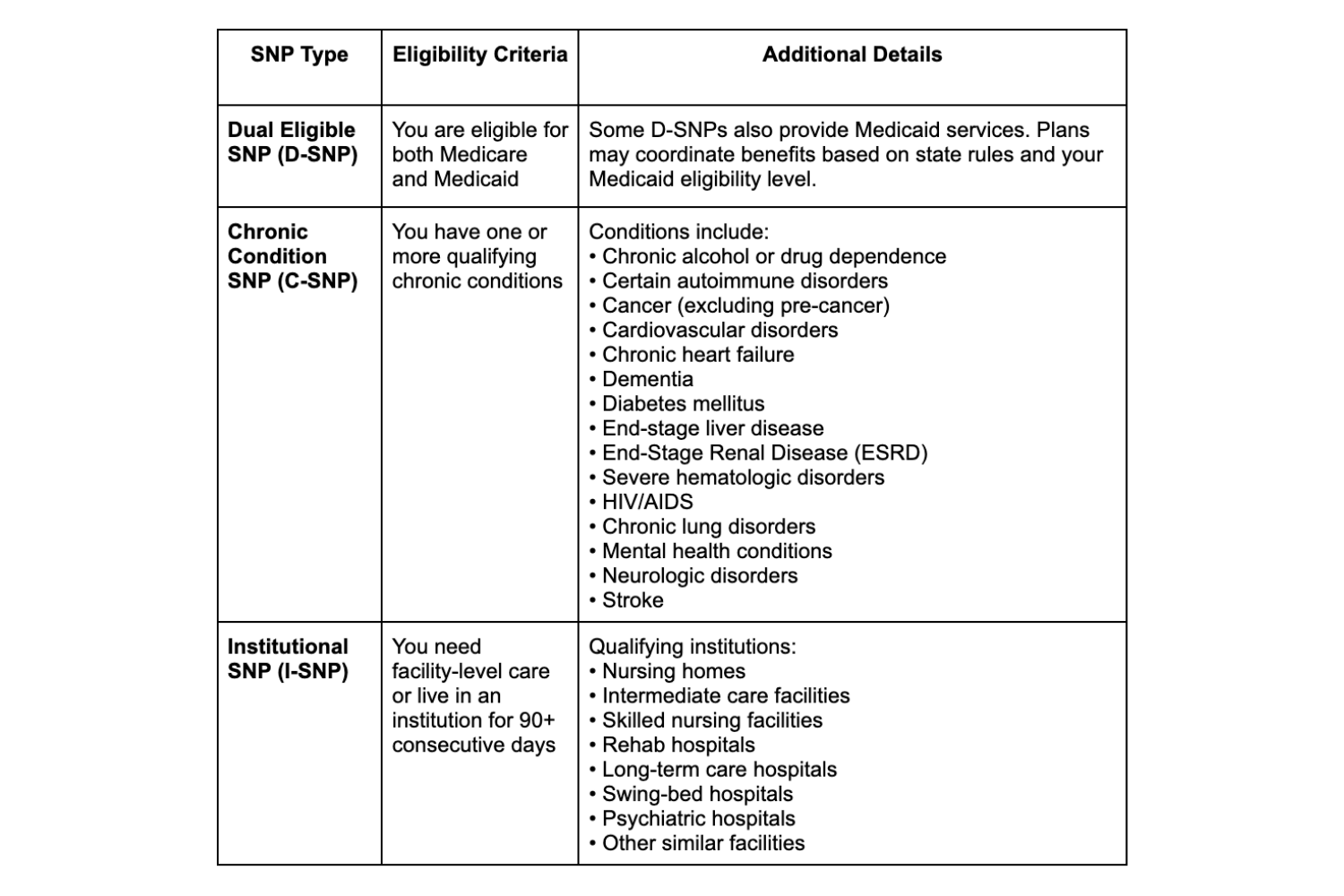What Are Medicare Special Needs Plans (SNPs)?

What Are Medicare Special Needs Plans?
Medicare Special Needs Plans (SNPs) are a type of Medicare Advantage Plan (Part C) designed to provide specialized healthcare coverage for individuals with specific needs or circumstances.
These plans can offer care coordinator services, tailored benefits, provider choices, and prescription drug coverage for people who qualify under particular conditions.
Targeted Care and Support
SNPs are offered by private insurance companies approved by Medicare. Like other Medicare Advantage Plans, SNPs cover all services provided under Original Medicare (Parts A and B).
However, SNPs are structured to deliver targeted care and support for certain groups of people.
All SNPs must include Medicare Part D prescription drug coverage. They also typically offer coordinated care through a network of providers experienced in managing the needs of the plan's target population.
Types of SNPs
There are three main types of Special Needs Plans. Here’s a breakdown of what each plan entails:
- Dual Eligible Special Needs Plans (D-SNPs): These plans serve individuals eligible for both Medicare and Medicaid, coordinating benefits across both programs. Some also offer extras like transportation or help accessing community services.
- Chronic Condition Special Needs Plans (C-SNPs): These plans cover people with neurologic disorders, or severe or disabling chronic conditions such as diabetes, heart failure, ESRD, HIV/AIDS. C-SNPs tailor care, drug coverage, and provider networks to meet these specific needs.
- Institutional Special Needs Plans (I-SNPs): These plans serve individuals in institutions or those needing 90+ days of in-home nursing care. I-SNPs provide coordinated services tailored to long-term care needs.
Who is Eligible for SNPs?
To be eligible for an SNP, individuals must meet all of the following criteria:
- Be enrolled in both Medicare Part A and Part B.
- Live in the plan’s service area.
- Meet the eligibility requirements specific to the type of SNP:
- For D-SNPs: Must qualify for both Medicare and Medicaid.
- For C-SNPs: Must have a documented diagnosis of a qualifying chronic condition.
- For I-SNPs: Must reside in or require a level of care provided by an institution.
See the chart below for more information regarding specific SNP
eligibility requirements.

SNP Benefits and Features
SNPs offer several features that differentiate them from standard Medicare Advantage Plans:
- Customized Benefits: SNPs may include services like case management, disease-specific education, and access to specialists aligned with the member’s condition.
- Coordinated Care: Members are typically assigned a care coordinator to help manage treatments, medications, and appointments across multiple providers.
- Integrated Services: Especially in D-SNPs, plans often integrate Medicare and Medicaid services, which can simplify care in some areas.
- Prescription Drug Coverage: All SNPs must provide Medicare Part D coverage with formularies designed to meet the medical needs of their member population.
When is Enrollment for an SNP?
Enrollment in an SNP can occur during standard Medicare enrollment periods:
- Initial Enrollment Period (IEP)
- Annual Enrollment Period (AEP): October 15 to December 7 each year
- Open Enrollment Period (OEP): January 1 to March 31 (for those already enrolled in a Medicare Advantage plan)
Special Enrollment Periods (SEPs) may also apply. For example, individuals who newly qualify for Medicaid or are diagnosed with a chronic condition that makes them eligible for a C-SNP may be able to join an SNP outside of the standard periods.
Not all SNPs are available in every region. Plan offerings vary by county and state, and each plan has its own list of covered services and provider networks. It is important to compare available plans to determine whether a specific SNP meets your healthcare needs and eligibility.
Contact one of our licensed insurance agents today for more information about SNPs or to see if a SNP could benefit you or any questions regarding Medicare Advantage Plans.
We do not offer every plan available in your area. Currently, we represent 7 organizations that offer 58 products in your area. Please contact
Medicare.gov, 1-800-MEDICARE, or your local State Health Insurance Program to get information on all of your options.
Not connected with or endorsed by the U.S. government or the federal Medicare program.










